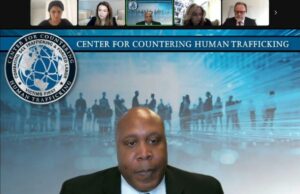In the summer of 2014, the world witnessed a chilling saga unfold as ISIS militants swept through Iraq’s northwestern Sinjar region. This catastrophic event marked the beginning of a horrifying chapter in the history of the Yazidi community. Thousands of Yazidi women and girls were forced into a life of unimaginable suffering – sexual slavery. Tragically, this heinous form of human trafficking served as a sinister means to fund the very terrorists who threatened global stability and security. Unfortunately, human trafficking is still used as a funding apparatus for terrorists and similar groups.
The Yazidi population, residing in their ancestral homeland, fell victim to a meticulously planned campaign by ISIS. Men and boys above the age of 14 were rounded up and brutally executed, while women and girls were abducted and subjected to a life of sexual servitude. Many were openly sold or given as “gifts” to ISIS members, and their lives were marked by persistent violence and repeated rape, often by different perpetrators. These horrific experiences extended over prolonged periods, leaving deep scars on the survivors.
The financial gains from trafficking these women were funneled into ISIS’s terrorist operations, further fueling their destructive agenda. This grave reality underscores the profound interplay between human trafficking and global security. While human trafficking has traditionally been viewed as a humanitarian concern, it’s vital to recognize its role in financing terrorist activities that threaten global freedoms and safety.
In a harrowing report by a UN investigative team called Unitad, evidence was unearthed that established the genocide committed by ISIS against the Yazidis. Over 3,000 Yazidis were killed, and 6,000 were captured, highlighting the magnitude of this tragedy. The United Nations officially classified the assault on the Yazidis’ homeland as genocide. This marked the beginning of a long journey towards justice. Boys were forced to fight for ISIS, men were executed if they resisted conversion to Islam, and women and girls were subjected to a life of slavery. This declaration was a crucial step in acknowledging the extent of the atrocities committed against the Yazidi community.
In a landmark 2021 trial held in Germany, Taha al-Jumailly, an Iraqi member of ISIS, was found guilty of genocide and human trafficking against the Yazidis. This marked a significant milestone in the quest for justice. Al-Jumailly enslaved a five-year-old Yazidi girl, subjecting her to inhumane treatment that led to her death. Germany’s proactive approach in pursuing prosecution against ISIS members for their crimes against the Yazidis serves as a commendable example of justice prevailing over terror.
However, the tragedy is not limited to the past. The horrific acts committed by ISIS have left lasting scars that extend beyond physical wounds. The use of human trafficking as a tool of warfare is a multifaceted strategy. It recruits and retains foreign fighters, rewards successful combatants, generates revenue, and shatters communities.
The tragic saga of Yazidi women and girls stands as a stark reminder of the intersection between human trafficking, terrorism, and global security. It calls for a holistic approach that not only seeks justice for the victims but also addresses the broader implications of these crimes on national and international levels. As the world remembers the Yazidi tragedy, it must also renew its commitment to preventing such horrors from ever happening again.


